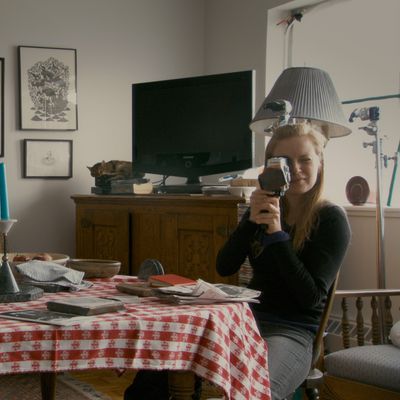
Sarah Polley frowns. WeÔÇÖre seated opposite each other in the conference room of a Beverly Hills boutique hotel, and IÔÇÖve just asked what I thought was an innocuous question about her new documentary, Stories We Tell. ÔÇ£IÔÇÖm hesitant to talk to you about that specific thing,ÔÇØ she replies to the query in question. ÔÇ£ItÔÇÖs such a spoiler.ÔÇØ ThatÔÇÖs the sort of answer you might expect to get from an actor guarding superhero movie secrets, but not from Polley, a 34-year-old actress-cum-director whoÔÇÖs made an indie documentary about the skeletons in her family closet.
But Stories We Tell (which opens today in New York, L.A., and other select cities) is no ordinary documentary, and thatÔÇÖs by design. (IÔÇÖll tread lightly when describing the plot, so as not to spoil anything that Polley didnÔÇÖt put in the trailer herself.) The movie begins as an investigation of PolleyÔÇÖs mother, Diane, who died when Sarah was 11. As we learn more about Mom ÔÇö a vivacious social butterfly who put her acting career on ice to raise a family ÔÇö Polley begins to reveal her real motivation for making the movie: SheÔÇÖs long suspected that she was the result of an affair Diane kept secret, which means that her charming father Michael may not actually be her real dad.
The secrets uncovered by Polley give Stories We Tell its spine, but sheÔÇÖs even more interested in how those secrets are told, and how what seems like an absolute truth to one family member can be contradicted by another. A working actress since the age of four ÔÇö sheÔÇÖs best known for The Sweet Hereafter and Zack SnyderÔÇÖs 2004 remake of Dawn of the Dead ÔÇö Polley has been around long enough to know that she could wield the movie camera like a trump card, telling her familyÔÇÖs history as though her take is the definitive version, and whatÔÇÖs fascinating about Stories We Tell is how she undercuts herself every time her side of the story begins to feel authoritative. She freely admits that one family member stopped speaking to her when she pressed ahead with the movie ÔÇö he felt that only he could tell this particular story correctly ÔÇö and there are a few surprise reveals late into Stories We Tell that make you question whether Polley is telling us the whole truth at all.
ÔÇ£Because the film was so much about storytelling and how stories are constructed, it would have felt really false to me to leave out the fact that I was constructing this story ÔÇö and that this, in itself, was very subjective,ÔÇØ explains Polley. Yes, this means that she puts herself in front of the camera, but donÔÇÖt mistake her for spotlight-hogging documentarians like Michael Moore or Morgan Spurlock. In one key Stories We Tell sequence, Sarah sits in a recording studio, coolly supervising her father Michael as he tells his side of the story. After he finishes one particularly fraught passage, Sarah demands a retake: She wasnÔÇÖt a fan of his line readings. SheÔÇÖs not the first documentary filmmaker to ask her subject to redo an emotional moment, but most directors would leave that sausage-making scene out, lest it damage their brands.
ÔÇ£I felt really uncomfortable including that,ÔÇØ she admits. ÔÇ£Especially because I wanted to be as much ÔÇÿmyselfÔÇÖ as I could, which meant not looking the way I would like to look in a movie, and not behaving necessarily the way I would want people to see me behave.ÔÇØ
So what inspired Polley to be so transparent about her process? Well, it didnÔÇÖt hurt that sheÔÇÖs spent three decades serving as the subject of profiles like this one. ÔÇ£Having been put in the position of being represented in ways that I didnÔÇÖt feel were rigorous enough, or accurate, I think I was kind of conscious of my role in doing that [to other people],ÔÇØ she says carefully. ÔÇ£I think I was very attuned to how vulnerable people were by speaking to me on camera, and I definitely wanted to be as ethical as I possibly could in terms of how they were represented. I probably agonized over that a little bit more than another filmmaker might have.ÔÇØ
One thing Polley no longer agonizes about is her acting career: Before making Stories We Tell, she wrote and directed the 2006 AlzheimerÔÇÖs drama Away From Her (which earned her an Oscar nomination for Best Adapted Screenplay) and last yearÔÇÖs Take This Waltz, starring Michelle Williams and Seth Rogen. ÔÇ£Acting is definitely not a priority, but I will do it every now and then,ÔÇØ Polley says. ÔÇ£IÔÇÖm acting in a Wim Wenders film starting in the summer and IÔÇÖm really looking forward to that, but itÔÇÖs never going to be the thing that drives me.ÔÇØ I ask Polley whether she still allows her representatives to put her name on the actor-availability lists that directors will consult when casting a new project. ÔÇ£No,ÔÇØ she says. Then she laughs at how quickly she gave her blunt answer, adding, ÔÇ£IÔÇÖve firmly taken myself out of that life.ÔÇØ
Still, she wouldnÔÇÖt mind doffing her filmmaker hat for just a moment if it would give her a better perspective on the knotty, personal movie sheÔÇÖs just made. ÔÇ£One of the things I wish I could do in my life would be to watch this film through somebody elseÔÇÖs eyes,ÔÇØ she says. ÔÇ£I just canÔÇÖt. I still see it as just a giant mess, and other people are seeing that it has a shape. ThatÔÇÖs really exciting, because I still have a hard time seeing it clearly.ÔÇØ

